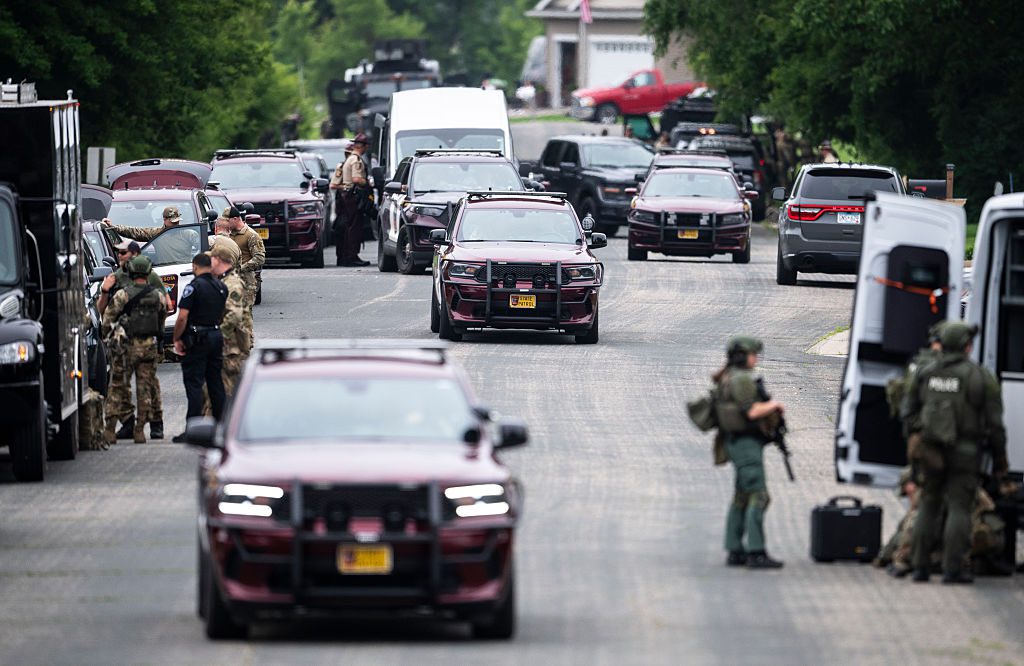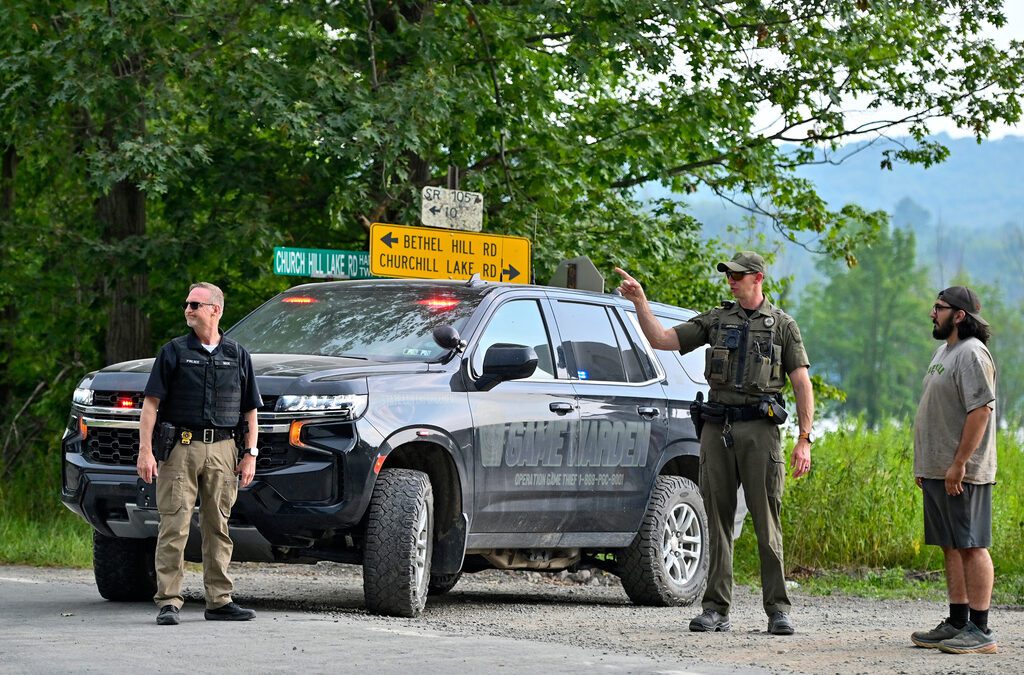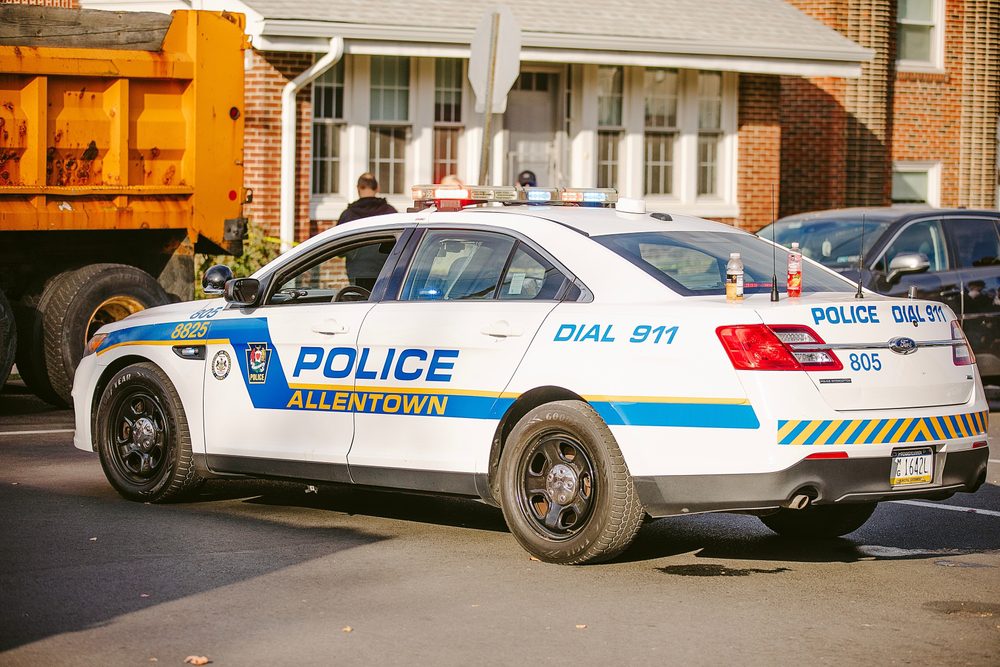
GREEN ISLE, MINNESOTA - JUNE 15: Law enforcement stage in a neighborhood on June 15, 2025 in Green Isle, Minnesota. Law enforcement agencies are searching for a suspect in the killing of DFL State Rep. Melissa Hortman and her husband, Mark Hortman, who were shot at their home yesterday. DFL State Sen. John Hoffman and his wife were also shot and hospitalized in a separate incident. Minnesota Gov. Tim Walz said during a press conference that the shooting "appears to be a politically motivated assassination." (Photo by Stephen Maturen/Getty Images)
After a string of high-profile incidents of political violence, along with an uptick in threats and harassment of elected leaders around the country, a group of Pennsylvania lawmakers announced they plan to introduce a series of bills intended to help keep legislators safe, and ensure seats are filled immediately in the event one is killed.
The proposed measures follow a series of high profile attacks on government officials, including the firebombing of the Governor’s Mansion in Harrisburg in April, and shootings that targeted two Democratic state lawmakers in Minnesota in June. Melissa Hortman, who was the former speaker of the Minnesota House of Representatives, was killed.
“These incidents only underscore the fact that political violence is on the rise, including here in Pennsylvania,” Rep. Greg Scott (D-Montgomery), said in a statement Tuesday. “Political violence has no place in our democracy, and it is paramount that state legislators are safe while serving the people of Pennsylvania.”
While two of the four measures address the immediate safety of lawmakers, others limit their exposure to the public and would ensure representation in the event a Pennsylvania legislator dies while in office.
Advocates, however, have raised concerns about some of the proposals, but agreed, given the state of political rhetoric in the country, lawmakers are right to have concerns for their safety.
One proposal would exempt their home addresses from disclosure under Pennsylvania’s Right-To-Know laws. A similar rule already exists for state judges.
“Our safety as legislators is threatened, and we must not let fear be a deterrent to our work,” co-prime-sponsor Rep. Roni Green (D-Philadelphia) said in a statement.
Philip Hensley-Robin, executive director of Common Cause PA, a government watchdog group, said he understood the concerns lawmakers might have with their addresses being public record, but worried about their constituents’ ability to ensure that they’re meeting residency requirements.
“Holding public office is a public trust, and there are some attendant transparency that comes along with that,” Hensley-Robin said. “There’s an existing state constitutional requirement that legislators are able to establish residency in their districts, and maintain it. For that requirement to be at all enforceable, someone has to be able to confirm residency.”
Hensley-Robin acknowledged, however, without seeing the bill’s language, which has not been released yet, it’s difficult to know whether it satisfies that requirement.
Another measure would place the Capitol Police, who guard the state Capitol building, under a new police board. Currently, they serve under the governor.
According to a press release from Nicole Baxter, a House Democratic Caucus spokesperson, the measure, “mirrors how the U.S. Capitol police force operates and would enable the legislature to evaluate whether security arrangements are sufficient in this politically volatile environment.”
A third measure doesn’t directly deal with a lawmaker’s safety, but would allow an incumbent to bypass the signature-gathering requirements to appear on a ballot. Instead, they would be able to file what’s called a certificate of nomination, creating a process similar to one allied for magisterial district judges.
Andrew McGinley, the vice president of external affairs at the Committee of Seventy, a nonprofit focused on ethics, democracy and transparency in Pennsylvania government, criticized the proposal.
He said the signature-gathering process is “almost like a proof of concept for a campaign that demonstrates that someone has support from a community.”
“Elected officials need to interact with voters and I don’t think getting rid of that step would increase security,” he said.
Moreover, he worried that only allowing incumbents to bypass signature requirements would give them an inherent advantage in the election.
In a call with the Capital-Star, Scott defended his proposal.
He said he didn’t believe that an incumbent skipping the signature-gathering process would have an advantage.
“The truth is, it’s gonna cost you more money and more time and energy,” Scott said of campaigns that skip the step.” Because those votes you would get — the people who go out and sign your petition are likely going to vote for you anyway. You still have to work for that, so it’s not like it’s a clear advantage.”
He also said, while the bill’s language is being finalized, he is considering including a provision that would bar a candidate who skips the petition process from challenging the petitions of other candidates.
A fourth bill would propose a constitutional amendment that would allow lawmakers to name three successors each in the event of their deaths, one of whom could be chosen by the House speaker to serve temporarily until a special election is held.
As it stands, a lawmaker’s seat is held vacant after they die until a a special election is held and the winner is sworn-in.
That’s what happened after Pittsburgh-area Democratic Rep. Matt Gergely died in January, leaving his seat vacant — and control of the chamber effectively tied — until a special election was held in March.
In order for the Pennsylvania Constitution to be amended, lawmakers in both chambers must pass identical measures by majority vote in two consecutive sessions. Then, the amendment would have to be voted on by Pennsylvanians during an election.
McGinley was also critical of this proposal, saying that allowing lawmakers to choose their own replacements was “undemocratic.”
“It reminds me of a monarchy sort of proposal,” he said.
Scott, however, said that, in a state where partisan control of the House is separated by a single vote, allowing somebody from the same party to serve in the event of a legislator’s death would help ensure the will of the voters is enacted.
He pointed to Minnesota, where, following the assassination of Hortman, the Democratic lawmaker, Republicans took control of what was previously an evenly split chamber.
“Let’s remove any type of incentive for an assassin to take one of us out, by saying, ‘This won’t shut down the chamber,’” Scott said. “We want to make sure government continues to operate and that those constituents still have a voice.”
He said he’s also considering a provision that would bar the temporary replacement from running in the special election.
Hensley-Robin, from Common Cause PA, noted that similar systems are in place in other countries. In elections for France’s National Assembly, for example, candidates’ potential replacements are on the ballot with them, in the case they become unable to serve.
“I think that would be an interesting way to approach this,” Hensley-Robin said. “It would be strengthened by having the names of their replacements right there on the primary and general election ballots for people to know who they’re voting for.”
Scott and co-prime-sponsors, Reps. Green and Heather Boyd, (D-Delaware), have yet to introduce the legislation, with drafting ongoing. They’re currently seeking co-sponsors.

Wounded Pennsylvania troopers recovering after chaotic shooting that left gunman, neighbor dead
A man fatally shot his neighbor in rural Pennsylvania and then unleashed a hail of gunfire on first responders, wounding two state troopers, running...

Coroner accuses Washington County DA of demanding fraudulent death certificate
‘I need this to be a homicide, I need it to win an election,’ prosecutor said, according to Coroner Timothy Warco A western Pennsylvania prosecutor...

He filmed an Allentown officer driving at him. Now he’s launching a First Amendment suit.
The lawsuit names the city of Allentown and two police officers, Sgt. Christopher Stephenson and now-retired Officer Dean Flyte. An Allentown man...

Mosquitoes in Pa. are carrying West Nile Virus: What you need to know
Mosquitoes have tested positive for the disease in more than half of Pennsylvania’s 67 counties, according to the Pennsylvania Department of...

Adult son convicted, sentenced to life for shooting and beheading father in Pennsylvania
A Pennsylvania man who posted a video of his father’s severed head on YouTube was convicted of murder Friday and sentenced to life without parole....



